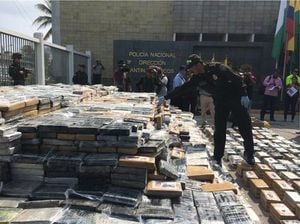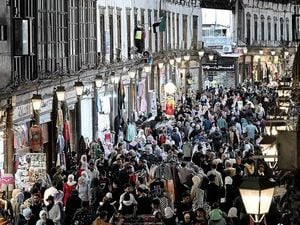Bishop Bruno Leonardo, a prominent religious figure and social media influencer, has publicly denied allegations linking his church, the Igreja Batista Avivamento Mundial, to the criminal organization Primeiro Comando da Capital (PCC). In a video posted on Instagram on March 27, 2025, the bishop characterized a recent report from Metrópoles as "fake news" and claimed he is being persecuted following the rapid growth of his online presence.
Leonardo, who boasts over 9.8 million followers on Instagram and more than 50 million subscribers on YouTube, has become a significant figure in the religious community, gaining notoriety for his engaging prayer videos, which he posts at least three times a day. His channel, which he started in April 2016, has accumulated an astonishing 7.7 billion views across 7,330 videos.
The controversy erupted after Metrópoles reported that the Federal Police (PF) mentioned Leonardo in a report investigating money laundering associated with the PCC. The report suggested suspicious transactions between the bishop and a company linked to Wiilian Barile Agati, a known figure within the criminal organization. In response, Leonardo stated that upon being approached by a journalist from Metrópoles on March 10, he instructed his lawyer to seek clarification from the PF in Curitiba.
According to Leonardo, the police confirmed that his church is not under investigation. "If a person is innocent, they have nothing to fear," he stated, emphasizing that his lawyer had met with the case's lead investigator, Dr. Eduardo Vessas, who assured them that no inquiry was directed at the church. He reiterated that all financial transactions made by the church are well-documented with invoices to support their legitimacy.
"We have invoices. They are here. Our lawyer presented them to the investigator, who acknowledged their existence. The report's claims of missing documentation are unfounded," Leonardo asserted. He drew parallels between the church's purchases and the potential future implications of associating with businesses that may later face legal scrutiny. "Last year, we purchased R$ 2 million worth of food to send to Rio Grande do Sul. If that distributor were to be implicated in illicit activities years later, would we be accused just for being customers?" he questioned.
Despite the controversy, Leonardo's influence continues to grow. His events, titled 'Visitas do Profeta,' have attracted massive crowds, including over 100,000 attendees at a recent gathering in Salvador. Previous events have seen participation numbers soar, with 40,000 attendees in 2022 and 62,000 in 2023. At the latest event, he pledged a donation of R$ 2 million to Hospital Santa Izabel, highlighting his commitment to charitable causes.
Leonardo's rise to fame began in his teenage years when he dedicated his life to preaching the gospel after a transformative experience at age 14. He has since leveraged social media to reach a broader audience, often sharing personalized messages that resonate with his followers. His posts, which initially focused on individual encouragement, have evolved into more sophisticated content, including announcements of new church branches in various cities.
As a leader of the Igreja Batista Avivamento Mundial, which was founded in the 2000s in Cajazeiras and is now headquartered on Avenida Antônio Carlos Magalhães in Salvador, Leonardo has positioned himself as a modern-day religious influencer. His success has not come without scrutiny; however, as his growing wealth and lifestyle have raised eyebrows. Reports indicate that he owns a luxury beach house in Interlagos, listed for R$ 16 million, and he has identified himself as a bachelor in Theology and a conciliation judge, a role linked to his church.
While some view his rise as a positive influence, others express concerns over the potential implications of his church's alleged connections to organized crime. The Federal Police and the Federal Public Ministry's reports have sparked debates about the intersection of faith and criminality in Brazil, raising questions about the responsibilities of religious leaders in maintaining transparency and accountability.
As the situation unfolds, Bishop Bruno Leonardo remains adamant about his innocence and the integrity of his church. He has called for prayers and support from his followers, stating, "You want to make enemies? Preach the word of God. That's what I see happening." His commitment to his faith and community appears unwavering, even in the face of adversity.
In a country where faith often intertwines with social issues, Leonardo's case exemplifies the complexities faced by modern religious leaders. As they navigate the challenges of public scrutiny and allegations, the balance between maintaining their spiritual mission and addressing legal concerns becomes increasingly critical.
With the ongoing investigation and public interest in the case, it remains to be seen how this situation will impact both Bishop Bruno Leonardo's ministry and the broader conversation surrounding the role of religion in contemporary society.






